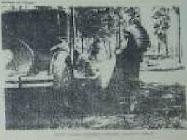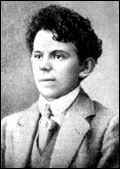When Ezra Pound was locked up in a prison cage, he was given a Bible & an old poetry anthology by a kindly G.I., his guard. Osip Mandelstam's forced exile & final deportation to Siberia, by Stalin, was a hundred times more severe, and infinitely more unjust. He too was short of books (& most other things) in the provincial town of Voronezh. One of the few books he took into exile, & steadfastly carried around with him, was a copy of the Divine Comedy.
On Feb 12, 1937, he wrote the following untitled poem, translated here by James Greene :
I'm plunged into a lions' den, a fort,
And sinking lower, lower, lower,
Under the yeast shower of these sounds:
Stronger than lions, more potent than the Pentateuch.
How near your summons:
Keener than commandments of childbirth, firstlings -,
Like strings of pearls at the bottom of the sea
Or baskets meekly borne by Tahitian women.
Motherland of chastening songs, come close,
The declivities deepening in your voice! - O primal mother,
The shy-sweet faces of our daughters
Aren't worth your little finger.
My time is still unbounded.
And I have accompanied the rapture of the universe
As muted organ pipes
Accompany a woman's voice.
Nadezhda Mandelstam (in Hope Against Hope, ch. 39) writes that M. had been listening to Marian Anderson, then visiting Moscow, on the radio - singing African-American spirituals, and that this was part of the poem's scenario; but they had recently returned from a visit to another exile, also a professional singer, who was distraught over her husband's sudden arrest and deportation, yet still hoping - desperately - to use her musical talents to earn a living & win her husband's release... & this too was part of the subtext.
Maybe there is yet another dimension in the background. M's devotion to the woman's deep-singing voice echoes Dante's relation to Beatrice. And there is a parallel between M's role as Daniel in the lion's den, sinking lower & lower, led by "chastening" (purgatorial) song, and Dante's redemptive journey through Hell. There is a pivotal, dramatic moment in the Purgatorio, at the conclusion of canto 9. Dante & Virgil have arrived at the very gates of Purgatory. They encounter an angel, who scratches 7 P's (for peccati, sins) across Dante's brow with the tip of his sword; then, using 2 keys given him by St. Peter, the angel opens the great doors so Dante can enter, & leave the Inferno behind. Just then, he hears voices singing on the other side :
Io mi rivolsi attento al primo tuono,
e "Te Deum laudamus" me parea
udire in voce mista al dolce suono.
Tale imagine a punto mi rendea
cio ch'io udiva, qual prender si suole
quando a cantar con organi si stea;
ch'or si or no s'intendon le parole.
[ Hearing that gate resound, I turned, attentive;
I seemed to hear, inside, in words that mingled
with gentle music, "Te Deum laudamus."
And what I heard gave me the very same
impression one is used to getting when
one hears a song accompanied by organ;
and now the words are clear and now are lost.] (trans. Allen Mandelbaum)
Mandelstam's "summons", the commandment of the "chastening song", the Muse & music for whom & by means of which he mingles both the power of Marian Anderson and the suffering of his victimized friend, here aligns Dante's Inferno with the lion's den of Stalin's prison-empire, & points with strange hope toward the way up & out (toward the "rapture of the universe") - as "one hears a song accompanied by organ."
Here, too, was a "true Dantescan voice."
7.23.2010
Subscribe to:
Post Comments (Atom)



No comments:
Post a Comment